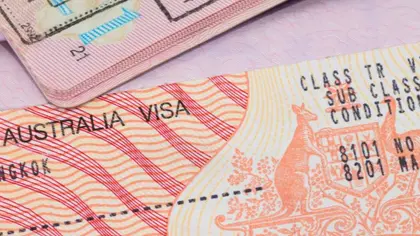As the third year of Russia’s full-scale invasion approaches on Saturday, Feb. 24, Ukrainians who came to Australia seeking refuge are increasingly asking about their future in the country.
After Russia’s full-scale invasion, many Ukrainians moved to Australia – which offered three-year visas.
JOIN US ON TELEGRAM
Follow our coverage of the war on the @Kyivpost_official.
“After arriving in the country with very little except some of their family and a few belongings, displaced Ukrainians have picked themselves up and sought to reestablish their lives,” Stefan Romaniw, Co-chair of the Australian Federation of Ukrainian Organisations (AFUO) said.
“They have learned English, found work, and their children have enrolled in local primary and high schools.”
However, as Russia’s brutal invasion continues, there’s no way in sight to get Ukrainians back to a safe and stable country.
So, the AFUO is calling on the government to review the current approach to visas for Ukrainians and to help establish viable options for permanent residency.
The limitation of a three-year stay for those who arrived on Humanitarian 786 visas before July 31, 2022, is causing major stress and anxiety for the displaced Ukrainians, the AFUO said in a recent press release.
Alternative visa options present significant challenges, with no readily identifiable pathway for them to secure permanent residency.
Similar challenges face displaced Ukrainians who arrived after July 31, 2022 on Tourist visas before transitioning to Emergency Bridging Visas (EBV).

Moscow Prime Suspect for Sabotage Aimed at Disrupting Olympic Games
While they may not face a three-year limit on their stay, this cohort awaits the government’s decision on Protection 866 visas.
“A very high proportion of displaced Ukrainians are women and children, as many of their partners or husbands have remained in Ukraine. They are motivated, highly educated and possess years of experience in occupations which are in high demand in the Australian labor market,” the AFUO said.
Despite having the skills, many can’t apply for skilled visa categories, or sponsorship visas through employers because they are over the age cut-off, their English language skills haven’t yet reached proficiency, their skills do not align perfectly with Australia’s specific demands, or companies are unwilling to sponsor them due to their lack of local experience and inability to provide documentation of their experience in Ukraine, the AFUO said.
“The most heartbreaking cases are the students who are about to leave high school but cannot access TAFE or tertiary education unless they secure a scholarship.
The AFUO said that it has been in regular consultation with Andrew Giles, the Australian Minister for Immigration, Citizenship and Multicultural Affair, and has been working with him in presenting the current situation and visa pathways for the government.
“We also recognize the Minister’s compassionate approach in recent times in dealing with extraordinary travel requests, which have included wives, mothers and daughters returning to Ukraine following the death of their husbands, sons, and fathers on the front line,” Romaniw adds.
“While we are grateful the government has welcomed these displaced Ukrainians, the humanitarian crisis in Ukraine continues. Displaced Ukrainians need certainty, and we look forward to working with the government to secure their futures in Australia, should they wish to stay,” Romaniw said.
A national representative survey commissioned by the AFUO in early February 2024 found that 59 percent of Australians agree with providing displaced people from Ukraine in Australia with assistance such as visas, education opportunities and employment support, with 15 percent disagreeing.
The survey found that 82 percent of Australians agree that Russia should cease its invasion and exit Ukraine, with only 3 percent disagreeing.
Eighty-two percent of Australians also believe that the government should maintain or increase its level of support for Ukraine, with a sizeable rise in the number of those who believe the government should provide more aid to Ukraine – increasing from 17 percent in June 2023, to 24 percent in February 2024.
You can also highlight the text and press Ctrl + Enter






